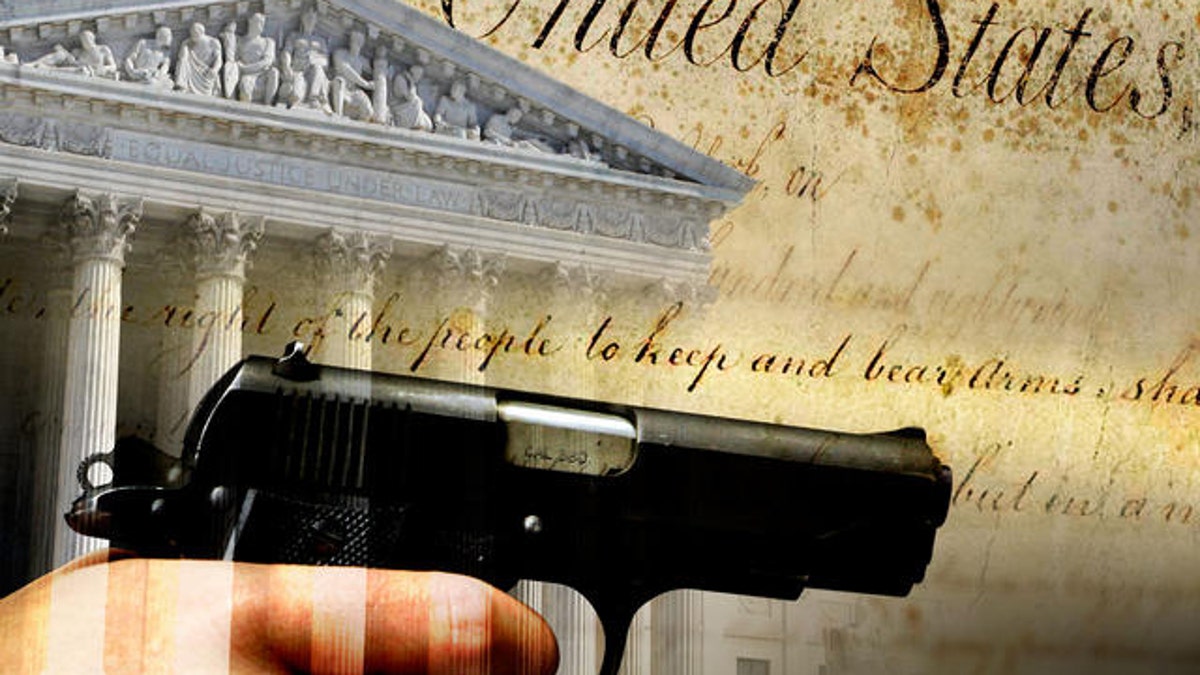
The Second Amendment Foundation is leading a civil action lawsuit in federal district court against Massachusetts challenging a law that denies non-U.S. citizens the right to possess a handgun in their own homes.
Under the current law in Massachusetts, legal permanent residents -- who carry what is commonly referred to as a "green card" -- are not allowed to hold a firearm identification card or license to carry of any kind. Instead, they must apply for a resident alien permit, which allows a person to possess only a “low capacity” rifle or shotgun.
Therein lies the case. The SAF, a non-profit group dedicated to the right to keep and bear arms, and the plaintiffs, believe that under the Second Amendment of the U.S. Constitution -- which gives Americans the right to bear arms -- there is no language that restricts firearms rights and privileges for lawfully admitted residents based on citizenship.
"One of the fundamental principles in this country is that people have rights," said SAF Executive Vice President Alan Gottlieb in a press release. "Among those rights is the right of self-defense, especially in one's own home."
The plaintiffs, Christopher M. Fletcher and Eoin M. Pryal, are lawful residents of Massachusetts who applied for "licenses to carry," primarily to defend themselves in their own home, according to specifics in the lawsuit. Prior to moving to California, Dr. Fletcher lived in the United Kingdom and is described in the lawsuit as an "enthusiastic participant in shooting sports, including training in handgun and rifle proficiency." After his move to Massachusetts, he applied for a license to carry, the suit said.
Pryal is currently a security guard, but he is also from the United Kingdom, serving as a rifleman in the British Territorial Army and as an engineering technician in the Royal Air Force, the court document said. The avid gun collector takes part in a variety of shooting sports, including hunting, while also working part time as an instructor at a firearms school, it said.
Nonetheless, they stressed that self-defense was their principle reason for filing the suit.
"This lawsuit truly illustrates the contradictory and irrational nature of the Commonwealths' firearms laws," Comm2A President Brent Carlton added. "Governor Deval Patrick's administration has broadly supported the immigrant community and noted our dependence on them for our continued prosperity while Massachusetts law treats those same individuals as inherently dangerous enough to justify their exclusion from certain fundamental rights protected by the Constitution of the United States."
Massachusetts has some of the toughest gun legislation in the country. A 2010 report from the Brady Campaign to Prevent Gun Violence lists the state as having the third strictest gun laws in the nation, behind California and New Jersey. To get a handgun in Massachusetts, a person must pay a $100 fee, have a license application approved by the police, and complete a gun safety course.
Judge Andrew Napolitano, Fox News host and former New Jersey Supreme Court judge, says the Massachusetts law will be found unconstitutional.
“We are talking about two groups of people, citizens versus legal non-citizens. The government has to treat them the same in the home with respect to self defense.”
Napolitano refers to two U.S. Supreme Court decisions, the Heller Case and McDonald Case, which both interpreted the right to defend yourself with a gun as a fundamental right.
“In both cases the Supreme Court ruled that the right to keep and bear arms is a fundamental right, a natural human right that doesn’t come from our government it comes from our humanity, when the Supreme Court says something is a fundamental right it is not distinguishing between citizens and non citizens.”
The judge also points out that Massachusetts cannot limit legal non- citizens to “low capacity rifles or shotguns.”
“They can make a distinction outside the home but they cannot make a distinction inside the home,” Napolitano said. “ A rifle is far more difficult to use then a handgun. The government cannot say to one class of persons you can use anything you want to protect yourself and another class of persons you can’t.”
Ron Chen, vice dean of the Rutgers University School of Law, also believes that the law will not stand the court challenge.
“Government classifications based on alienage are constitutionally suspect,” Chen said. “I can’t for the life of me think of a reason Massachusetts is going to grant a right to a citizen but won’t it grant it to a legal permanent resident. If they’ve been given a green card, Congress has determined that they are fit to live here forever. [The law] plays into irrational prejudice.”
There have been similar cases like this before, involving concealed weapons permits, successfully lead by the ACLU.
But, as the judge points out, concealed weapons in public has not been ruled by the U.S. Supreme Court and is therefore decided by the states. The only thing the Supreme Court has decided on is a handgun in the home.
While the ACLU has not yet been involved with this particular case, they have supported similar cases involving concealed weapons gun rights and legal permanent residents, most recently in South Dakota and Kentucky.
In South Dakota, a non-citizen successfully sued the state in January, alleging the concealed weapons law was discriminatory. That law, amended in 2002, made U.S. citizenship a requirement to carry a concealed weapon.
In 2008 in Kentucky, a British national successfully sued the state with the help of the ACLU over the same issues. The Concealed Deadly Weapons law in the Bluegrass State was changed so that permanent legal residents could be eligible for concealed carry permits.
“We’re not talking about a gun in school, on the street or in the workplace,” Napolitano said. “We are talking about a gun in the home to protect yourself from someone breaking in.”
Contact Bryan Llenas atBryan.Llenas@foxnewslatino.com or on Twitter @LlenasLatino.
Follow us on twitter.com/foxnewslatino
Like us at facebook.com/foxnewslatino












































